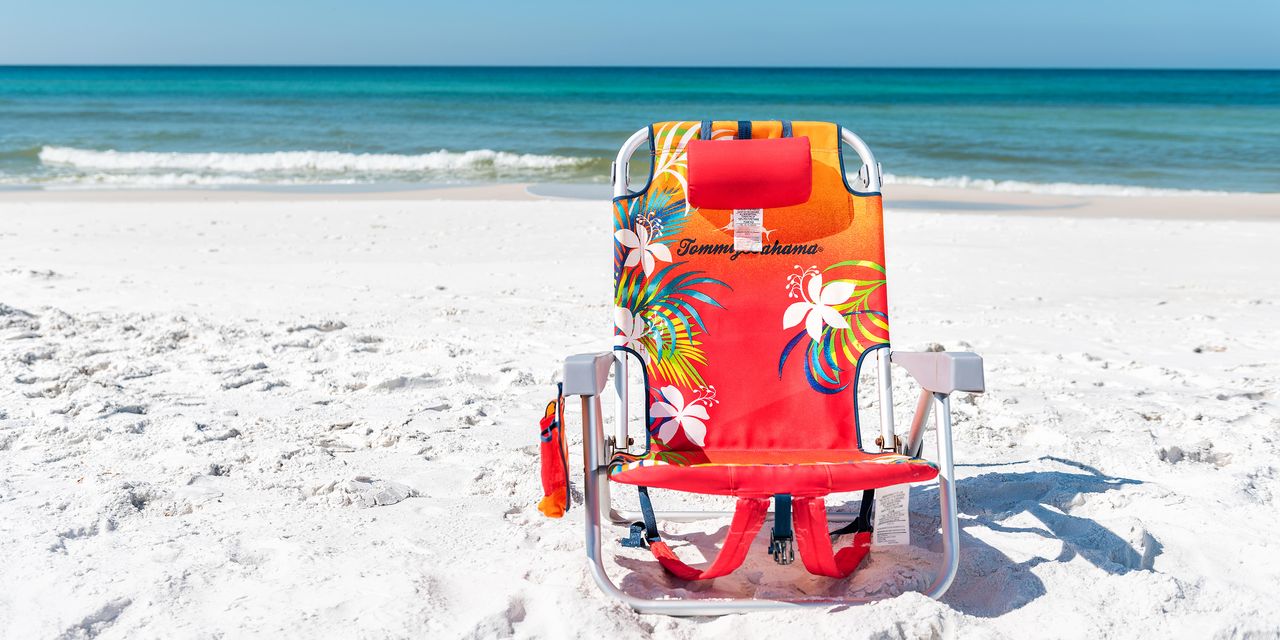Many vacationers revel in the leisurely concept of island time, a world apart from the rigors of reality. There’s nothing laid back about the pace of profit growth at Tommy Bahama’s parent company.
Oxford Industries
(ticker: OXM) is a buttoned-up name for an apparel maker that’s anything but: It gets nearly two-thirds of sales from casual wear heavyweight Tommy Bahama, maker of patterned, bright, warm weather men’s and women’s apparel and accessories, and its branded restaurants. The remainder come from other apparel brands, including floral-forward Lilly Pulitzer and the recently acquired boho chic of Johnny Was.
Together, they have proven to be an upscale powerhouse, enjoying the margins of a luxury company and leapfrogging profits even as many other retailers struggle. And if results from other high end brands this earnings season, from
Ralph Lauren
(RL) to
Lululemon Athletica
(LULU), are anything to go by, Oxford Industries could shine when it reports on Wednesday. But Oxford trades at just 8.4 times fiscal 2023 earnings expectations of $11.76 for the period ending January 2024, well below similar companies.
“Oxford Industries overall is a better business, with return on invested capital above 20%, growing faster and with higher margins than pretty much all peers,” says Eric DeLamarter, founder and portfolio manager of Half Moon Capital, which owns the stock. “[But its valuation] is nearly the lowest of the peer set.”
The culprit was Oxford’s full fiscal-2023 earnings guidance of per share of $11.50 to $11.90, below the then-$11.91 consensus estimate. Earning are lower because management plans to invest significantly in various parts of the business, from more efficient fulfillment infrastructure to new stores and eateries.
The plan will cause capital expenditures to nearly double for the year, to roughly $90 million, and weigh on margin growth, although gross margins already stand a juicy 62.5%, not far below those of luxury powerhouses like
Hermès
(HESAY) and
LVMH Moët Hennessy Louis Vuitton
(LVMUY). That decision will, the company believes, further bolster its growth, but some investors are nervous about the pace of spending given the shaky state of consumer spending.
None of that should worry investors, says Raife Giovinazzo, lead portfolio manager of the
Behavioral Small-Cap Equity Fund
(FTHSX) at Fuller & Thaler, which owned 2.7% of Oxford’s total shares outstanding at the end of 2022. “It was all really good news and we didn’t see anything that made us think we would need to trim our position,” Giovinazzo explains.
The average analyst price target for Oxford is $125, while more bullish voices, like DeLamarter, believe the stock “should be a $187 stock by year-end as they continue to execute.” Oxford closed Monday at 99.05, down 0.7%.
It’s hard to argue against the wisdom of investing in the business, given the progress Oxford has made so far. As Half Moon’s DeLamarter notes, the company has some of the highest direct-to-customer revenue among its peers—meaning it doesn’t have to rely on wholesale partners and gets more benefit from maximizing its distribution capabilities. The spending will also go to expanding the number of Tommy Bahama retail stores with attached Marlin Bars, which tend to have twice the sales a square foot.
Nor will these investments be all that costly: Bottom-line consensus estimates for this fiscal year and next—at $11.76 and $12.50 per share—still represent new records, and mid-single-digit year-over-year growth.
“This is a solid company and the fact that people are asking these questions despite its success, and are willing to discount earnings surprises…shows it’s not getting as much credit as it deserves,” says Fuller & Thaler’s Giovinazzo. “People are underreacting to how powerful their brands are.”
That’s particularly true of Tommy Bahama, whose core customer is solidly middle-aged with a six-figure income—a cohort that’s not immune to economic stress, but is nonetheless more likely to keep spending. Moreover, they’re more set in their tastes and like the consistency of the brand’s breezy image, meaning it’s less likely to fall victim to the whims of fashion.
That resilience is evident in the brand’s sales, which have grown nearly every year since at least 2010; Tommy Bahama revenue in the just-completed fiscal 2023 was $880 million, 30% higher than it was in the prepandemic year of fiscal 2020.
Tommy Bahama’s alone is likely worth more than stock is right now. Half Moon’s DeLamarter argues that the division is worth at least $121—more than 20% above the current price—based on enterprise value to earnings before interest and taxes (EV/EBIT) multiples for comparable retailers like Deckers Outdoors (
DECK
) and
Columbia Sportswear
(COLM), along with the company’s low debt loads.
The company now has a $1.6 billion market cap. That could ultimately make Oxford an acquisition target given the lifestyle model it’s built—you can buy Tommy Bahama beach chairs to match your button down—and loyal customers.
For now, Oxford looks like a smart way to own a retailer with a sunny outlook.
Write to Teresa Rivas at [email protected]
Read the full article here





